 Libri di Thomas Nagel su Unilibro.it) Libri di Thomas Nagel su Unilibro.it)
|
|
2025 |
 Title :
Cosa si prova a essere un pipistrello?
Title :
Cosa si prova a essere un pipistrello?Author: Nagel Thomas Publisher: Raffaello Cortina Editore "La coscienza è ciò che rende il problema mente-corpo davvero intrattabile." Inizia così il classico saggio di Thomas Nagel del 1974 Cosa si prova a essere un pipistrello?. Il testo ha inaugurato l'interesse ormai diffuso nei confronti della coscienza come problema centrale per la filosofia, la psicologia e le neuroscienze; ha anche influenzato il riconoscimento della coscienza delle creature non umane come importante oggetto di studio. Nagel sosteneva che l'essenziale soggettività dell'esperienza cosciente - come è per la creatura che la vive - significa che le teorie riduzioniste della mente, che cercano di analizzarla in termini fisici, non potranno mai avere successo. Ne consegue che la concezione fisica della realtà deve essere superata se si vuole che la scienza comprenda la mente. Nel suo 50° anniversario, questa edizione ripropone il testo con una postfazione di Anil Seth e una nuova prefazione dell'autore che discute le origini e l'influenza del libro, oltre a un saggio che presenta le successive riflessioni di Nagel su come rispondere al problema posto da Cosa si prova a essere un pipistrello? € 13,00
Scontato: € 12,35
|
|
|
2023 |
 Title :
I paradossi dell'uguaglianza. Una proposta non utopica di giustizia sociale
Title :
I paradossi dell'uguaglianza. Una proposta non utopica di giustizia socialeAuthor: Nagel Thomas Publisher: Edizioni Società Aperta È possibile conciliare la sfera degli interessi personali con quella dei valori collettivi? Di fronte a disuguaglianze economiche e sociali crescenti, è necessario trovare una soluzione. In questo libro, Thomas Nagel tenta di chiarire la natura del conflitto tra individuo e collettività, la cui riconciliazione dev'essere il compito essenziale di qualsiasi sistema politico. La sua proposta è un'originale teoria di convivenza civile, che cerca di conciliare la politica con accettabili modelli di moralità, condizioni necessarie per l'uguaglianza e la giustizia sociale. Prefazione di Ian Carter. € 18,00
Scontato: € 17,10
|
|
|
2020 |
 Title :
Cosa si prova ad essere un pipistrello?
Title :
Cosa si prova ad essere un pipistrello?Author: Nagel Thomas Publisher: Castelvecchi Ciò che vediamo, capiamo, viviamo non è mai svincolato dalla peculiare percezione «coscientizzata» che ci isola nella nostra specificità di individui e di esseri umani. Così per tutti, pipistrelli compresi. Ecco allora che a partire da una domanda semplice e apparentemente ingenua si spalanca tutto un ampio panorama di grandi questioni filosofiche, che in un irresistibile crescendo conducono il pensatore dal problema del rapporto soggetto-mondo e mente-corpo a un'interrogazione sulle possibilità e i limiti della scienza e di una conoscenza oggettiva in generale, fino alla prospettiva di un linguaggio a venire che permetta di aprire un varco tra i tanti vicoli ciechi in cui sembriamo destinati ad arenarci. € 7,50
Scontato: € 7,13
|
|
|
2018 |
 Title :
Lo sguardo da nessun luogo
Title :
Lo sguardo da nessun luogoAuthor: Nagel Thomas; Veca S. (cur.) Publisher: Mimesis Lo sguardo da nessun luogo è il lavoro di maggiore ambizione fondativa nella riflessione di Nagel, dove cruciali interrogativi etici emergono a partire da una discussione sullo statuto della soggettività. Numerosi problemi di condotta e valutazione derivano infatti dalla tensione fra le pretese di un punto di vista impersonale e oggettivo (esterno) che possiamo adottare su noi e sul mondo, e le pretese di un punto di vista personale e soggettivo (interno). Questa apparente aporia si profila nelle pagine di Nagel come una dualità epistemica inderogabile, alla cui luce l'autore riesamina i temi tradizionali della libertà, del valore, dell'azione giusta e della vita buona. € 26,00
Scontato: € 24,70
|
|
|
2015 |
 Title :
Mente e cosmo. Perché la concezione neodarwiniana della natura è quasi certamente falsa
Title :
Mente e cosmo. Perché la concezione neodarwiniana della natura è quasi certamente falsaAuthor: Nagel Thomas; Di Francesco M. (cur.) Publisher: Raffaello Cortina Editore Se la coscienza non può essere spiegata dalla fisica e dalla biologia nella loro forma attuale, e se la mente è un prodotto dell'evoluzione biologica, "allora", afferma Nagel,"la biologia non può essere una scienza puramente fisica". Convinto del fallimento della concezione materialistica della natura, che non spiega i tratti fondamentali del nostro mondo connessi con la mente (coscienza, intenzionalità, significato, valori), Nagel sostiene la necessità di rileggere l'intera storia dell'evoluzione assumendo la centralità dei fenomeni mentali e coscienti, governati da principi che, nella loro forma logica, sarebbero teleologici piuttosto che meccanicistici. La visione riduzionistica del mondo, che pone la materia a fondamento di tutta la realtà, è ancora molto diffusa. Riconoscerne i limiti - è questo il senso della proposta di Nagel - rappresenta il primo passo nella ricerca di possibili alternative. € 16,00
Scontato: € 15,20
|
 Title :
Questioni mortali. Le risposte della filosofia ai problemi della vita
Title :
Questioni mortali. Le risposte della filosofia ai problemi della vitaAuthor: Nagel Thomas; Veca S. (cur.) Publisher: Il Saggiatore "Questioni mortali" raccoglie gli interventi più incisivi di Thomas Nagel- uno dei massimi esponenti della filosofia analitica statunitense - sui dilemmi fondamentali che interessano il senso, la natura e il valore dell'esistenza umana. La gamma dei temi affrontati è ampia e ricca di implicazioni concrete: dalla vita privata a quella pubblica; dai grandi quesiti di metafisica, filosofia della mente e teoria della conoscenza ai rapporti tra biologia e etica; dai nostri atteggiamenti nei confronti della morte e dei comportamenti sessuali fino all'ingiustizia sociale, alla guerra e al potere. Filo conduttore del pensiero di Nagel è il continuo riemergere delle domande di fondo sul valore, il significato, il fine e la fine della vita mortale. Interrogativi affascinanti e insieme angoscianti, a cui è impossibile rispondere in maniera univoca, se non cadendo nell'illusione o nell'indifferenza. Come argomenta il noto saggio "Che effetto fa essere un pipistrello?", le teorie materialiste sul funzionamento del pensiero umano trascurano l'elemento della coscienza: la percezione della nostra realtà di essere umani. Gran parte delle difficoltà che incontriamo in vita dipende da una concezione limitata o erronea dell'identità e della libertà personali. Discutendo impostazioni etiche differenti, questi saggi propongono di incorporare i risultati teorici della ricerca filosofica nel contesto della conoscenza di sé. € 19,00
|
|
2014 |
 Title :
Una brevissima introduzione alla filosofia
Title :
Una brevissima introduzione alla filosofiaAuthor: Nagel Thomas Publisher: Il Saggiatore "Con chiarezza e accessibilità, Thomas Nagel illustra e interpreta secondo la propria visione gli argomenti fondamentali della filosofia: la conoscenza, il rapporto mente-corpo, il linguaggio, il libero arbitrio, il confine tra giusto e sbagliato, la morte, il significato della vita. I problemi su cui si sono arrovellati i pensatori nei secoli vengono affrontati non a partire dalle teorie e dagli assunti dei grandi maestri, ma riflettendoci a fondo, facendo filosofia nel modo più diretto." (dalla pefazione di Salvatore Veca) € 11,00
Scontato: € 10,45
|
|
|
1913 |
 Title :
Anarchy, State, And Utopia
Title :
Anarchy, State, And UtopiaAuthor: Nozick Robert, Nagel Thomas (FRW) Publisher: Basic Books € 21,30
|
|
|
2013 |
 Title :
Cosa si prova ad essere un pipistrello?
Title :
Cosa si prova ad essere un pipistrello?Author: Nagel Thomas Publisher: Castelvecchi Le teorie di taglio materialista sul funzionamento e le modalità dell'esperienza sembrano inesorabilmente destinate a trascurare la componente essenziale della coscienza, elemento per definizione mobile, originario, inafferrabile e irriducibile, che tuttavia caratterizza e delinea il nostro mondo percettivo, guida l'esperienza e la rende ciò che è. Ciò che noi vediamo, capiamo, viviamo, non è mai svincolato dalla peculiare percezione "coscientizzata" che ci isola nella nostra specificità di individui e di esseri umani. Così per tutti, pipistrelli compresi. Picco allora che a partire da una domanda semplice e apparentemente ingenua si spalanca tutto un ampio panorama di grandi questioni filosofiche, che in un irresistibile crescendo conducono il pensatore dal problema del rapporto soggetto-mondo e mente-corpo a un'interrogazione sulle possibilità e i limiti della scienza e di una conoscenza oggettiva in generale, fino alla prospettiva di un linguaggio a venire che permetta di aprire un varco tra i tanti vicoli ciechi in cui sembriamo destinati ad arenarci. € 7,50
|
|
|
1912 |
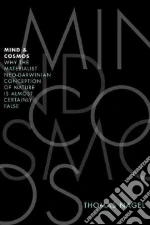 Title :
Mind and Cosmos
Title :
Mind and CosmosAuthor: Nagel Thomas Publisher: Oxford University Press The modern materialist approach to life has utterly failed to explain such central features of our world as consciousness, intentionality, meaning, or value. This failure to account for something so integral to nature as mind, argues philosopher Thomas Nagel, is a major problem, threatening to unravel the entire naturalistic world picture, extending to biology, evolutionary theory, and cosmology. In Mind and Cosmos, Nagel provides an insightful analysis of the Darwinian world view, offering a perspective quite different from that found in such books as Richard Dawkins' The Blind Watchmaker. What we know about how mind and everything connected with it depends today on our ideas about the origin and spread of living organisms as a result of the universe's evolution. But Nagel states that "it is prima facie highly implausible that life as we know it is the result of a sequence of physical accidents together with the mechanism of natural selection." What is the likelihood that self-reproducing life forms should have come into existence spontaneously? What is the likelihood that, as a result of physical accident, a sequence of viable genetic mutations should have occurred that was sufficient to permit natural selection? Nagel's skepticism is not based on religious belief or on a belief in any definite alternative. He does suggest that if the materialist account is wrong, then principles of a different kind may also be at work in the history of nature, principles of the growth of order that are in their logical form teleological rather than mechanistic. In spite of the great achievements of reductive materialism, it is a world view ripe for displacement. Nagel shows that to recognize its limits is the first step in looking for alternatives, or at least of being open to their possibility. € 31,90
|
 Title :
Mortal Questions
Title :
Mortal QuestionsAuthor: Nagel Thomas Publisher: Cambridge Univ Pr € 17,00
|
|
1910 |
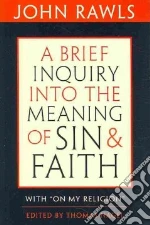 Title :
A Brief Inquiry into the Meaning of Sin and Faith
Title :
A Brief Inquiry into the Meaning of Sin and FaithAuthor: Rawls John, Nagel Thomas (EDT), Cohen Joshua (CON), Adams Robert Merrihew (CON) Publisher: Harvard Univ Pr John Rawls never published anything about his own religious beliefs, but after his death two texts were discovered which shed extraordinary light on the subject. A Brief Inquiry into the Meaning of Sin and Faith is Rawls’s undergraduate senior thesis, submitted in December 1942, just before he entered the army. At that time Rawls was deeply religious; the thesis is a significant work of theological ethics, of interest both in itself and because of its relation to his mature writings. “On My Religion,” a short statement drafted in 1997, describes the history of his religious beliefs and attitudes toward religion, including his abandonment of orthodoxy during World War II. The present volume includes these two texts, together with an Introduction by Joshua Cohen and Thomas Nagel, which discusses their relation to Rawls’s published work, and an essay by Robert Merrihew Adams, which places the thesis in its theological context. The texts display the profound engagement with religion that forms the background of Rawls’s later views on the importance of separating religion and politics. Moreover, the moral and social convictions that the thesis expresses in religious form are related in illuminating ways to the central ideas of Rawls’s later writings. His notions of sin, faith, and community are simultaneously moral and theological, and prefigure the moral outlook found in Theory of Justice. € 18,70
|
|
|
2009 |
 Title :
Secular Philosophy and the Religious Temperament
Title :
Secular Philosophy and the Religious TemperamentAuthor: Nagel Thomas Publisher: Oxford Univ Pr on Demand This volume collects recent essays and reviews by Thomas Nagel in three subject areas. The first section, including the title essay, is concerned with religious belief and some of the philosophical questions connected with it, such as the relation between religion and evolutionary theory, the question of why there is something rather than nothing, and the significance for human life of our place in the cosmos. It includes a defense of the relevance of religion to science education. The second section concerns the interpretation of liberal political theory, especially in an international context. A substantial essay argues that the principles of distributive justice that apply within individual nation-states do not apply to the world as a whole. The third section discusses the distinctive contributions of four philosophers to our understanding of what it is to be human--the form of human consciousness and the source of human values. € 41,40
|
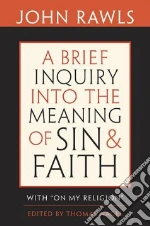 Title :
A Brief Inquiry into the Meaning of Sin and Faith
Title :
A Brief Inquiry into the Meaning of Sin and FaithAuthor: Rawls John, Nagel Thomas (EDT), Cohen Joshua (CON), Adams Robert Merrihew (CON) Publisher: Harvard Univ Pr John Rawls never published anything about his own religious beliefs, but after his death two texts were discovered which shed extraordinary light on the subject. A Brief Inquiry into the Meaning of Sin and Faith is Rawls's undergraduate senior thesis, submitted in December 1942, just before he entered the army. At that time Rawls was deeply religious; the thesis is a significant work of theological ethics, of interest both in itself and because of its relation to his mature writings. “On My Religion,” a short statement drafted in 1997, describes the history of his religious beliefs and attitudes toward religion, including his abandonment of orthodoxy during World War II. The present volume includes these two texts, together with an Introduction by Joshua Cohen and Thomas Nagel, which discusses their relation to Rawls's published work, and an essay by Robert Merrihew Adams, which places the thesis in its theological context. The texts display the profound engagement with religion that forms the background of Rawls's later views on the importance of separating religion and politics. Moreover, the moral and social convictions that the thesis expresses in religious form are related in illuminating ways to the central ideas of Rawls's later writings. His notions of sin, faith, and community are simultaneously moral and theological, and prefigure the moral outlook found in Theory of Justice. € 29,80
|
 Title :
È possibile una giustizia globale?
Title :
È possibile una giustizia globale?Author: Nagel Thomas Publisher: Laterza L'impresa di dare forma a un ideale comprensibile di giustizia globale è strettamente connessa a due questioni cruciali: la relazione fra giustizia e sovranità e l'ampiezza e i limiti dell'eguaglianza, intesa come una naturale richiesta di giustizia. Se guardiamo allo sviluppo storico delle concezioni di giustizia e di legittimità dello Stato-nazione, sembra che di solito la sovranità abbia preceduto la legittimità e mai -come sarebbe più ovvio aspettarsi - viceversa. Persino nel caso più famoso di creazione di una federazione democratica, l'illegittimità precedette la legittimità: la fondazione degli Stati Uniti dipese dalla tutela della schiavitù, senza la quale non si sarebbe mai raggiunta l'unanimità fra le tredici ex-colonie. Regimi ingiusti e palesemente illegittimi costituiscono insomma i precursori necessari del progresso verso la legittimità e la democrazia, perché creano il potere centralizzato che si può a quel punto contestare, e forse volgere in altre direzioni senza distruggerlo. "È improbabile che assisteremo alla diffusione di una giustizia globale nel lungo periodo, a meno di non creare prima istituzioni sovranazionali forti che non mirano alla giustizia, ma perseguono piuttosto interessi comuni e riflettono le diseguaglianze nel potere di contrattazione fra gli Stati ora esistenti." Il punto è capire se tutto questo può essere fatto di comune accordo, e non con l'imposizione violenta. € 8,00
Scontato: € 7,60
|
|
2004 |
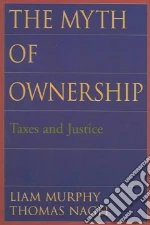 Title :
The Myth of Ownership
Title :
The Myth of OwnershipAuthor: Murphy Liam B., Nagel Thomas Publisher: Oxford University Press In a capitalist economy, taxes are the most important instrument by which the political system puts into practice a conception of economic and distributive justice. Taxes arouse strong passions, fueled not only by conflicts of economic self-interest, but by conflicting ideas of fairness. Taking as a guiding principle the conventional nature of private property, Murphy and Nagel show how taxes can only be evaluated as part of the overall system of property rights that they help to create. Justice or injustice in taxation, they argue, can only mean justice or injustice in the system of property rights and entitlements that result from a particular regime. Taking up ethical issues about individual liberty, interpersonal obligation, and both collective and personal responsibility, Murphy and Nagel force us to reconsider how our tax policy shapes our system of property rights. € 37,20
|
 Title :
What Does It All Mean?
Title :
What Does It All Mean?Author: Thomas Nagel Publisher: OXFORD UNIVERSITY PRESS € 12,80
|
|
2001 |
 Title :
The Last Word
Title :
The Last WordAuthor: Nagel Thomas Publisher: Oxford University Press If there is such a thing as reason, it has to be universal. Reason must reflect objective principles whose validity is independent of our point of view--principles that anyone with enough intelligence ought to be able to recognize as correct. But this generality of reason is what relativists and subjectivists deny in ever-increasing numbers. And such subjectivism is not just an inconsequential intellectual flourish or badge of theoretical chic. It is exploited to deflect argument and to belittle the pretensions of the arguments of others. The continuing spread of this relativistic way of thinking threatens to make public discourse increasingly difficult and to exacerbate the deep divisions of our society. In The Last Word, Thomas Nagel, one of the most influential philosophers writing in English, presents a sustained defense of reason against the attacks of subjectivism, delivering systematic rebuttals of relativistic claims with respect to language, logic, science, and ethics. He shows that the last word in disputes about the objective validity of any form of thought must lie in some unqualified thoughts about how things are--thoughts that we cannot regard from outside as mere psychological dispositions. € 39,30
|
|
|
1999 |
 Title :
L'ultima parola. Contro il relativismo
Title :
L'ultima parola. Contro il relativismoAuthor: Nagel Thomas Publisher: Feltrinelli Quest'opera vuol essere una risposta razionalistica al rifiuto dei soggetivisti di riconoscere l'oggettività della ragione, vale a dire il fatto che la ragione (se esiste) deve necessariamente riflettere principi effettivi la cui validità è indipendente dal punto di vista personale. E' la ragione così intesa a permetterci di elaborare una concezione del mondo in cui noi, le nostre impressioni e le nostre pratiche siamo contenuti, poiché essa non dipende dalla nostra prospettiva personale. € 16,53
|
 Title :
I paradossi dell'uguaglianza
Title :
I paradossi dell'uguaglianzaAuthor: Nagel Thomas Publisher: Il Saggiatore € 9,30
|
|
1996 |
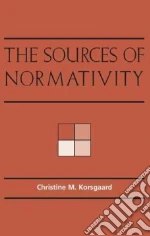 Title :
The Sources of Normativity
Title :
The Sources of NormativityAuthor: Korsgaard Christine M., Cohen G. A., Geuss Raymond, Nagel Thomas, Williams Bernard, O'Neill Onora (EDT) Publisher: Cambridge Univ Pr Ethical concepts are, or purport to be, normative. They make claims on us: they command, oblige, recommend, or guide. But where does their authority over us come from? Christine Korsgaard identifies and examines four accounts of the source of normativity that have been advocated by modern moral philosophers--voluntarism, realism, reflective endorsement, and the appeal to autonomy--and shows how Kant's autonomy-based account emerges as a synthesis of the other three. Her discussion is followed by commentary from G.A. Cohen, Raymond Geuss, Thomas Nagel, and Bernard Williams, and a reply by Korsgaard. € 35,70
|
|
|
1995 |
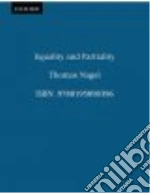 Title :
Equality and Partiality
Title :
Equality and PartialityAuthor: Thomas Nagel Publisher: BERTRAMS PRINT ON DEMAND Derived from Thomas Nagel's Locke Lectures, Equality and Partiality proposes a nonutopian account of political legitimacy, based on the need to accommodate both personal and impersonal motives in any credible moral theory, and therefore in any political theory with a moral foundation. Within each individual, Nagel believes, there is a division between two standpoints, the personal and the impersonal. Without the impersonal standpoint, there would be no morality, only the clash, compromise, and occasional convergence of individual perspectives. It is because a human being does not occupy only his own point of view that each of us is susceptible to the claims of others through private and public morality. Political systems, to be legitimate, must achieve an integration of these two standpoints within the individual. These ideas are applied to specific problems such as social and economic inequality, toleration, international justice, and the public support of culture. Nagel points to the problem of balancing equality and partiality as the most important issue with which political theorists are now faced. € 57,50
|
|
|
1994 |
 Title :
La possibilità dell'altruismo
Title :
La possibilità dell'altruismoAuthor: Nagel Thomas Publisher: Il Mulino € 9,30
|
|
|
1989 |
 Title :
View from Nowhere
Title :
View from NowhereAuthor: Thomas Nagel Publisher: Oxford university press academ Human beings have the unique ability to view the world in a detached way: We can think about the world in terms that transcend our own experience or interest, and consider the world from a vantage point that is, in Nagel's words, "nowhere in particular". At the same time, each of us is a particular person in a particular place, each with his own "personal" view of the world, a view that we can recognize as just one aspect of the whole. How do we reconcile these two standpoints--intellectually, morally, and practically? To what extent are they irreconcilable and to what extent can they be integrated? Thomas Nagel's ambitious and lively book tackles this fundamental issue, arguing that our divided nature is the root of a whole range of philosophical problems, touching, as it does, every aspect of human life. He deals with its manifestations in such fields of philosophy as: the mind-body problem, personal identity, knowledge and skepticism, thought and reality, free will, ethics, the relation between moral and other values, the meaning of life, and death. Excessive objectification has been a malady of recent analytic philosophy, claims Nagel, it has led to implausible forms of reductionism in the philosophy of mind and elsewhere. The solution is not to inhibit the objectifying impulse, but to insist that it learn to live alongside the internal perspectives that cannot be either discarded or objectified. Reconciliation between the two standpoints, in the end, is not always possible. € 33,50
|
 Title :
Una brevissima introduzione alla filosofia
Title :
Una brevissima introduzione alla filosofiaAuthor: Nagel Thomas Publisher: Il Saggiatore € 16,53
|
|
1988 |
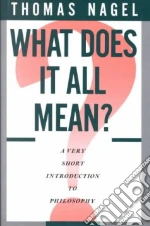 Title :
What Does It All Mean?
Title :
What Does It All Mean?Author: Thomas Nagel Publisher: BERTRAMS PRINT ON DEMAND Should the hard questions of philosophy matter to ordinary people? In this down-to-earth, nonhistorical guide, Thomas Nagel, the distinguished author of Mortal Questions and The View From Nowhere, brings philosophical problems to life, revealing in vivid, accessible prose why they have continued to fascinate and baffle thinkers across the centuries. Arguing that the best way to learn about philosophy is to tackle its problems head-on, Nagel turns to some of the most important questions we can ask about ourselves. Do we really have free will? Why should we be moral? What is the relation between our minds and our brains? Is there life after death? How should we feel about death? In a universe so vast, billions of light years across, can anything we do with our lives really matter? And does it matter if it doesn't matter? These are perennial questions we ask about the human condition, and Nagel probes them, and others like them, thoughtfully, clearly, and with humor. He states his own opinions freely but with refreshing modesty, always leaving it open to readers to entertain other solutions, encouraging them to think for themselves. Nagel is eminently qualified to introduce the uninitiated to the world of philosophical inquiry. Singled out by the Chicago Literary Review as "one of the sharpest analytic philosophers in America today," he has been praised in the New York Times Book Review for writing "sensitively and elegantly" and in the Times Literary Supplement for his ability, rare among philosophers, to combine "profundity with clarity and simplicity of expression." Never rarefied, What Does It All Mean? opens our eyes to a side of the world we rarely consider, demonstrating that philosophy is no empty study but an indispensable key to understanding our lives. It challenges us to think hard and clearly, to ask questions, to try out ideas and raise possible objections to them--in short, to become philosophers ourselves. € 20,30
|